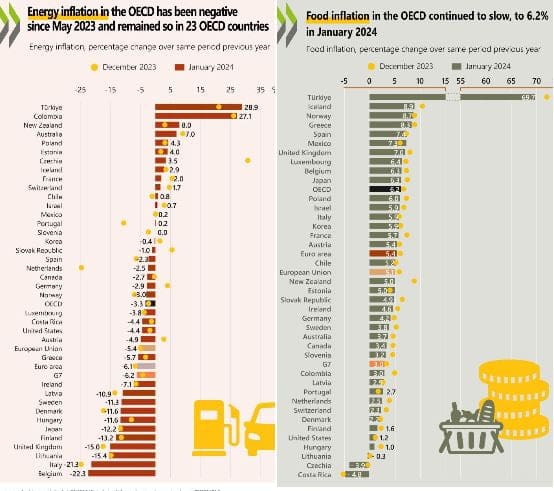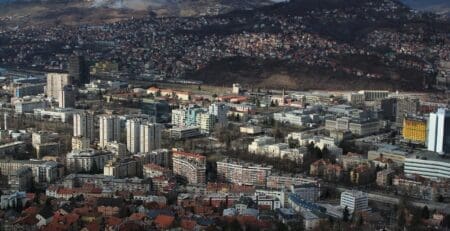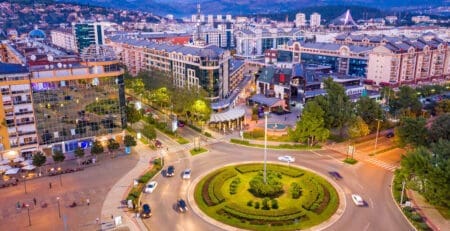Inflation of energy products and food falling in the world and the region at the beginning of 2024
Energy inflation in the OECD has been negative since May 2023 and remained so in 23 OECD countries. However, Türkiye and Colombia experienced energy inflation more than 25% in January 2024.
Food inflation in the OECD continued to slow, to 6.2% in January 2024 compared to 6.7% in December 2023. It declined in three-quarters of OECD countries and was below 10% everywhere except Türkiye.
Montenegro‘s annual inflation rate rose slightly to 4.4% in January 2024 from a two-year low of 4.3% in December 2023, as prices rose faster for housing and utilities (6.8% vs. 5.6%). and clothing and footwear (15.9% vs. 12.8%). They also returned for communication (0.6% vs -0.3%). On the other hand, the cost has increased less for food and non-alcoholic beverages (1.3% vs. 1.7%), transportation (1.2% vs. 1.6%), miscellaneous goods and services (4.8% vs. 5.7%), health (4.5% vs. 1.6 %). 5.5%), and alcoholic beverages and tobacco (4.6% vs. 5.6%). From a month ago, consumer prices rose by 0.5% after three consecutive periods of decline.
Serbia‘s annual inflation rate fell to 5.6 percent in February 2024 from 6.4 percent in the previous month, marking the lowest reading since August 2021 and matching market expectations. Costs eased mainly for food and non-alcoholic beverages (4.7 percent vs. 7.2 percent), housing and utilities (7.6 percent vs. 8.4 percent), recreation and culture (7 percent vs. 8.6 percent), miscellaneous goods and services (3.9 percent vs. 4.1 percent ), and health (8.9 percent versus 9.7 percent). On the other hand, it grew faster for transport (3 percent versus 1.9 percent) and alcoholic beverages and tobacco (8.1 percent versus 6.4 percent). On a monthly basis, consumer prices increased by 0.6 percent, after increasing by 0.3 percent in January.
The annual inflation rate in N. Macedonia fell to 3% in February 2024, the lowest since June 2021, from 3.2% in the previous month. Prices slowed for food and non-alcoholic beverages (1.5% vs. 1.9% in January 2024), alcoholic beverages, tobacco and narcotics (11.6% vs. 12.6%), clothing and footwear (4.3% vs. 4.9%), and furniture and household appliances (5.4 % versus 6.3%). Meanwhile, prices rose faster for housing, water, electricity, gas and other fuels (2.5% vs. 1.9%) and health (5.9% vs. 5.8%) and fell more slowly for transportation (-0.5% vs. -2 %). On the other hand, the cost of education was withdrawn (-0.6% against 2.8%). On a monthly basis, prices rose by 0.4%, following a 0.1% increase in January.
Kosovo‘s annual inflation rate accelerated to 2.2% in February 2024 from a near three-year low of 1.8% in January 2024, mainly due to a milder decline in transport costs (-0.4% vs. -4.5% ). Also, prices increased at a faster rate for housing and utilities (7% vs. 6.4%), alcoholic beverages and tobacco (5.3% vs. 5.2%) and furniture (3.6% vs. 3.1%). In contrast, they slowed the most for food and non-alcoholic beverages (1.5% vs. 2.4%), miscellaneous goods and services (1.8% vs. 2.3%), and clothing and footwear (3.2% vs. 3.6%). On a monthly basis, consumer prices rose 0.1% in February, down from 0.3% in January.
The annual rate of inflation in Albania for the month of February decreased to 2.6%. The annual increase in prices in February was mainly influenced by the group “food and non-alcoholic beverages”, the group “rent, water, fuel and energy” as well as “entertainment and culture”.
Compared to February 2023, the biggest increase in prices is observed in the “entertainment and culture” group with 4.9%, followed by the “furniture, home appliances and home maintenance” groups with 4.7%, while the “food and non-alcoholic beverages” group ” has increased by 2.7%.
Within the food group, the prices of the subgroup “milk, cheese and eggs” increased by 4.7%, followed by the subgroups “vegetables” by 4.6%, “meat” and “fish” increased by 4.2% each.
In monitoring the drop in prices in EU and OECD countries, the marked drop in fuel and energy prices is noticeable, starting from -1% in Slovakia, -5.7% in Greece to -21.3% in Italy and -22.3% in Belgium.
Likewise, food prices have shown a decrease compared to the end of 2023, starting from 4.6% in Ireland, 4.2% in Germany, 2.3% in Switzerland, up to 1% in Hungary and -2.3% in the Czech Republic.
The same situation with a slowdown and more moderate for food can be seen in Serbia with 4.7%, in Montenegro with an increase of up to 1.3%, in North Macedonia and Kosovo with growth that also slowed down with 1.5%. While in Albania, unlike the countries of the region, the increase in food prices is 2.7%, influenced by domestic production.




Leave a Reply
You must be logged in to post a comment.